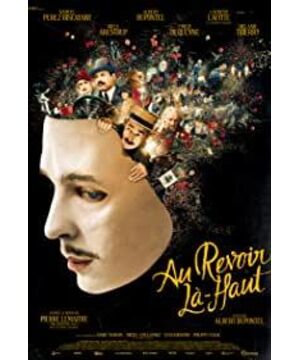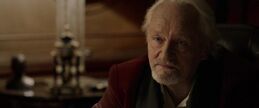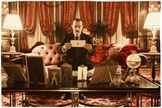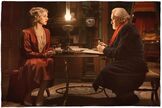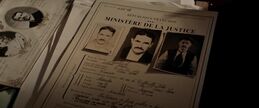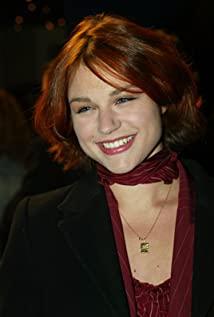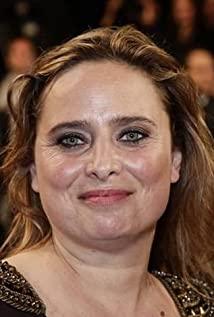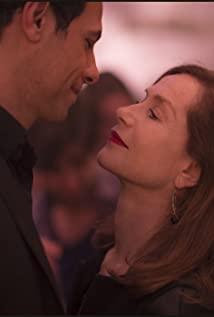[Topic] Political oligarchs' interests game to trigger war, ambitious people shoot their own soldiers to provoke war, as well as undeserved burials, coffins that cut corners, threats and bribes that are easy to use... The first half hour of the movie is all about the crimes of war. But when I'm used to the dark absurdity of real news, and I hate this stereotype more than I am angry, it's hard to feel how profound this criticism is. Pradelle's evil is just pure evil. Rather than revealing evil, I want to know how the good little characters in the movie will fight (classical tragedy) or dissolve (modern comedy) evil. The former, such as Siegfried's "German Lesson", has a deep and cold pathos; the latter, such as Calvino's "Livestock Grove", has deep irony in its light strokes; In the container without feeling awkward, it is the Italian film "Life is Beautiful". "Goodbye in Heaven", barely belongs to the second category. Despite the irony of being buried alive, Pradelle did not get the justice he deserved and his death was accidental. Perhaps there is a hint of unpleasant retribution, but it is not pleasant. This kind of unannounced evil and inexplicable revenge may be more in line with the helpless reality of little people. I feel that the French pursue freedom more than justice; they love humor more than truth. If it was the author of "The Kite Runner," that kind of tough-guy writing would have at least made Albert shoot Pradelle in the chest; and if it was Alexievich and her The "Zinc Skin Baby Soldier", that kind of bloody blood, so Albert didn't even have a chance to shoot Pradelle. But here, Pradelle is not the worst one, he is just a clowned "Julien" who has dehumanized his humanity. Just as Neville chanted the "Funny" spell to put Snape in his grandmother's floral dress, the audience roared with laughter to dispel their fear of evil. This isn't the black humor of Catch 22, there's no loop of absurdity to break free. At the end of the movie, the sun in North Africa is bright, and the Albert family smiles brightly. [Character] Pradair is a simple bad guy, and he will not hesitate to criticize this kind of bad guy who has no sense of substitution; Albert is a mediocre good guy who uses his professional knowledge to do some bad things of Zorro-style robbing the rich and helping the poor. It will confuse the audience. When these secondary characters are masked, the only thing worth pondering in the film is Edward, who can only convey his emotions through masks. In fact, what Edward wanted at first was just a hug. But the utilitarian father who deals with the real world gives this delicate and delicate son only money. A tale of affordable fathers and brilliant sons like Kafka and His father, like Nick and his father in Dead Poets Society. In all fairness, I don't want my kids to see a movie like Dead Poets Society. Geniuses are rare after all, and being down-to-earth is the way of life, so this kind of story will be repeated again and again. It's just that in this play, the romantic French is on Edward's side. If it weren't for the war, I think Edward would have been a good painter. Maybe I will meet my father in a sunny exhibition hall. After listening to my father say "I'm proud of you", tears welling up in my eyes, I will return to the big house and continue the affectionate relationship between father and son. But the war changed everything. After hugging his father, Edward jumped and jumped off the balcony. No matter how beautiful the mask is, what it can show is limited after all; how cynical and despairing and sad in the heart behind the mask, this turbulent wave may not be felt by us. Why did Edward not lose a leg or a hand, why did he refuse all kinds of advice from plastic surgeons, and if it was Quasimodo who had his jaw blown off, I don't think he would choose suicide. But Edward is different. He paints on the battlefield, and he captures beauty, although not in the traditional sense. Just like Baudelaire's flower of evil, Edward also showed the beauty that can touch the soul in the unbearable reality. For this reason, he did not hesitate to break with his father, gave up his comfortable life, and was not afraid of falling cannonballs. Therefore, he is not a person who can survive and can endure a broken self who can eat with a straw in his throat for a lifetime. In his entire life, the most splendid thing was a grand trial in the presidential suite, but it was nothing more than a self-deceiving carnival of a small group of people. My favorite is the mask in the bookmark. The melancholy cannot be redeemed. The arrogance of the lion and the luxury of the peacock cannot match the endless emptiness behind the melancholy. When the knot in the depths of the nightmare is unraveled, when the father recognizes the art he loves, what is there to be nostalgic in this world? The so-called goodbye in the sky is just a different way of completing life. I vaguely remember the extremely sincere, pure and public life of "Wild Rose of Paris" and "One Flew Over the Cuckoo's Nest". When they are trapped by reality and fall into madness, death is a good choice. So don't force Edward to live. [narrative] To some extent, the film resolves the contradiction. Behind the absurdity and irony, the story of "Goodbye in Heaven" is actually very conservative. As Red is to Andy in The Shawshank Redemption, Albert is to Edward. There are two contradictions to be resolved in the story: Albert and Pradelle, and Edward and the old father. The former ends with Pradelle's death, the latter ends with Edward's leap. Albert and Edward intertwined and traveled on their own trajectories, at the same time. and become the narrator of another story. Each shot moves seamlessly, smoothly and inevitably into the next event. When the film's emotions become heavy, the director slips it lightly; or when the warmth is about to overflow his heart, the camera switches and reverses, reminding the coldness of reality. In this way, the director has always controlled the conflict to a certain extent, switching between the comic and the pathetic, the gorgeous and the dark, and performing a witty concerto. Compared with some domestic films with simple plots, complex emotions, and incoherent motives, I prefer this narrative method. Also, at one point in the movie, the little girl undoes Edward's veil, looking directly and gently touching Ander's chin, which he can't actually look at. The light was soft, and the backs of the little girl and Edward appeared staggered, always covering their chin. I also like this kind of subtlety.
View more about See You Up There reviews


